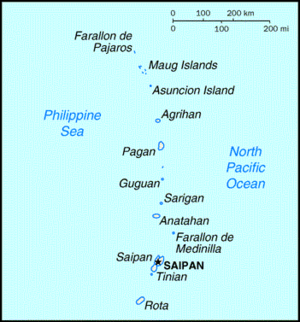Northern Mariana Islands: Difference between revisions
imported>Howard C. Berkowitz (New page: The '''Commonwealth of the Northern Mariana Islands (CMMI)''' derives from the United Nations'Trust Territory of the Pacific Islands (TTPI), created in 1947, and administered by the United...) |
Pat Palmer (talk | contribs) |
||
| (7 intermediate revisions by 3 users not shown) | |||
| Line 1: | Line 1: | ||
The '''Commonwealth of the Northern Mariana Islands (CMMI)''' derives from the United Nations'Trust Territory of the Pacific Islands (TTPI), created in 1947, and administered by the United States. As of 1990, the TTPI was dissolved and a local constitution developed. | {{subpages}} | ||
[[Image:Commonwealth of the Northern Marianas.gif|thumb|left|Commonwealth of the Northern Marianas]] | |||
The '''Commonwealth of the Northern Mariana Islands (CMMI)''' derives from the United Nations' Trust Territory of the Pacific Islands (TTPI), created in 1947, and administered by the United States. As of 1990, the TTPI was dissolved and a local constitution developed. | |||
The Marianas constitution provides for a governor, a lieutenant governor, a bicameral legislature (18 members in the House of Representatives and 9 members in the Senate), and a local court system including Superior and Supreme Courts. There is a U.S. District Court for the Northern Marianas Islands, and, as of 2008, the CMMI has a | The Marianas constitution provides for a governor, a lieutenant governor, a bicameral legislature (18 members in the House of Representatives and 9 members in the Senate), and a local court system including Superior and Supreme Courts. There is a U.S. District Court for the Northern Marianas Islands, and, as of 2008, the CMMI has a non-voting delegate in the U.S. Congress. | ||
It is three-hundred mile archipelago consisting of 14 islands, with a total land area of 183.5 square miles, with the population primarily on Saipan, Rota and Tinian. The northern, largely uninhabited islands are Farallon de Medinilla, Anatahan, Sariguan, Gudgeon, Alamagan, Pagan, Agrihan, Asuncion, Maug Islands, and Farallon de Pajaro. | |||
==Saipan== | |||
[[Saipan]] was a major Japanese base in the Second World War, which the Japanese considered the anchor of their inner defensive perimeter. The U.S. victory at the [[Battle of Saipan]] led to the fall of the Tojo government and the beginnings of a peace faction. | |||
Saipan is 3,300 miles from [[Honolulu, Hawaii|Honolulu]]; 5,625 from [[San Francisco]]; 1,272 miles from [[Tokyo]]; and 3,090 miles from [[Sydney]]. | |||
==Tinian== | |||
The U.S. had an airbase on Tinian, from which the 509th Bomb Group carried out the [[nuclear attacks against Japan]]. | |||
Revision as of 11:15, 2 February 2023
The Commonwealth of the Northern Mariana Islands (CMMI) derives from the United Nations' Trust Territory of the Pacific Islands (TTPI), created in 1947, and administered by the United States. As of 1990, the TTPI was dissolved and a local constitution developed.
The Marianas constitution provides for a governor, a lieutenant governor, a bicameral legislature (18 members in the House of Representatives and 9 members in the Senate), and a local court system including Superior and Supreme Courts. There is a U.S. District Court for the Northern Marianas Islands, and, as of 2008, the CMMI has a non-voting delegate in the U.S. Congress.
It is three-hundred mile archipelago consisting of 14 islands, with a total land area of 183.5 square miles, with the population primarily on Saipan, Rota and Tinian. The northern, largely uninhabited islands are Farallon de Medinilla, Anatahan, Sariguan, Gudgeon, Alamagan, Pagan, Agrihan, Asuncion, Maug Islands, and Farallon de Pajaro.
Saipan
Saipan was a major Japanese base in the Second World War, which the Japanese considered the anchor of their inner defensive perimeter. The U.S. victory at the Battle of Saipan led to the fall of the Tojo government and the beginnings of a peace faction.
Saipan is 3,300 miles from Honolulu; 5,625 from San Francisco; 1,272 miles from Tokyo; and 3,090 miles from Sydney.
Tinian
The U.S. had an airbase on Tinian, from which the 509th Bomb Group carried out the nuclear attacks against Japan.
